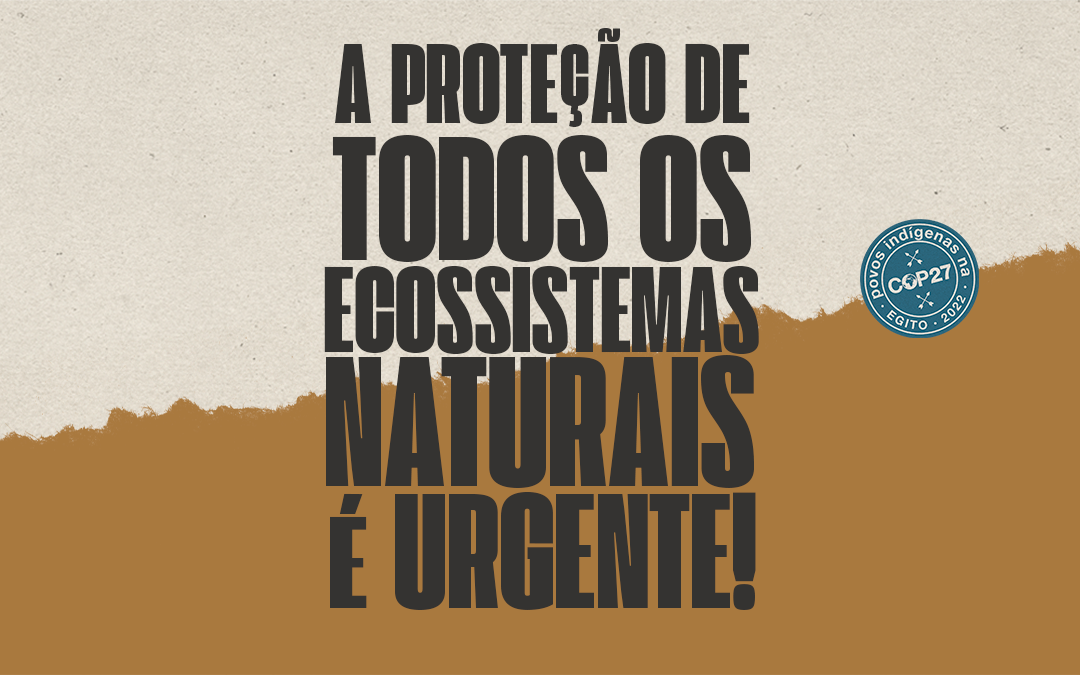We, from the Brazil’s Indigenous People Articulation (APIB) and the National Coordination of Articulation of Rural Black Quilombola Communities (CONAQ) emphasise our position in defence of all natural ecosystems in Brazil. It is extremely important that climate negotiations take into account not only forests, but also savannas, grasslands, wetlands and all the different expressions of nature around the world. These landscapes also contribute to the fight against climate change and are part of the solutions for a more sustainable, inclusive and socially just world.
We urge the European Union to take the necessary and urgent measures to prevent imported deforestation, as well as the land conversion of other native wooded lands. This is crucial in the Cerrado context, as most of the soy exported to the European Union is produced in this highly threatened biome.
The Cerrado is not a degraded landscape; it is the world’s richest savanna. It is home to hundreds of indigenous people, cultures and territories, as well as to communities of quilombolas, geraizeiros* and other traditional cultures and populations. It is also the largest agricultural frontier in the world, bearing the largest impact on soy imported by Europe. Monitoring tools are available to ensure the protection of the Cerrado – all we need is political will!
The same goes for all other natural ecosystems that are not forests: Pampas, Pantanal, Caatinga, as well as for the Atlantic Forest. If the European regulation against deforestation restricts itself to only protecting forests, it will have very limited impact – as almost 75% of the Cerrado would remain unprotected. The same would happen to 76% of the Pantanal and of the Pampas and almost 90% of the Caatinga. Moreover, the European regulation would have a perverse effect, as it would intensify the pressure of destruction on these ecosystems and on its people.
Ultimately, by being restricted to forests, the European regulation against deforestation would have the opposite effect of its original objective. This is why this law must also include “native other wooded lands” (primary savannas), rather than being restricted to native forests only.
This would increase the Cerrado protection from 26% to 82%, Pantanal protection from 24% to 42% and of the Caatinga from 11% to 93%. The Brazilian Cerrado is losing nearly a million hectares each year, and this destruction is increasing. An eventual revision of the law to be discussed in 2 years will not prevent the loss of millions of hectares of valuable ecosystems, the emission of millions of tons of carbon, nor violent attacks on hundreds of traditional people and territories. Therefore, we reiterate our claim:
THE EUROPEAN LEGISLATION ON DEFORESTATION MUST ENSURE THE RESPECT OF THE HUMAN RIGHTS OF ALL INDIGENOUS, QUILOMBOLA AND TRADITIONAL PEOPLE, AND PROTECT THE ENTIRE CERRADO NOW, BY INCLUDING NATIVE AND PRIMARY “OTHER WOODED LANDS” IN THE SCOPE OF THE LAW TEXT TO BE APPROVED THIS YEAR.
For technical details on this topic, refer to the following documents:
- APIB Note 7/9/22 https://apiboficial.org/2022/09/09/apib-pede-garantia-dos-direitos-indigenas-e-inclusao-de-todos-os-biomas-na-lei-anti -deforestation-of-eu/
- WWF call for more ambitious EU legislation, including Other Wooded Lands https://www.wwf.org.br/?82870/Call-for-a-more-ambitious-EU-regulation-on-deforestation-free-products- including-other-wooded-lands
- Manifesto for an immediate end to deforestation for our 1.5o future: https://www.oc.eco.br/wp-content/uploads/2022/11/Manifesto-DCF-PT-1.pdf
- Letter from the Peoples of the Cerrado to the European Union: https://ispn.org.br/uniao-europeia-pode-vetar-importacoes-ligadas-ao-desmatamento/
- Technical Note from the Mapbiomas Network on Potential Impacts of the European Union Due Surveillance Criterion on non-forest ecosystems (updated version 07.07.2022) https://mapbiomas-br-site.s3.amazonaws.com/Nota%20T%C3%A9cnica /Note_T%C3%A9cnica_UE_07.07.2022.pdf
- *Threatened Countryside: who are the geraizeiros protecting the land https://www.brasildefato.com.br/2020/12/14/threatened-countryside-who-are-the-geraizeiros-protetcting-the-land
- COP27: cerrado desmatado pode reduzir águas nos rios em 1/3 e afetar geração de energia, indica estudo https://www.bbc.com/portuguese/brasil-63562381
- Study shows that the Cerrado may lose ⅓ of its water sources. https://ispn.org.br/cerrado-pode-perder-um-terco-da-agua-aponta-estudo/
Egypt, Sharm el Sheikh, 15 November 2022
ARTICULATION OF THE INDIGENOUS PEOPLES OF BRAZIL – APIB

